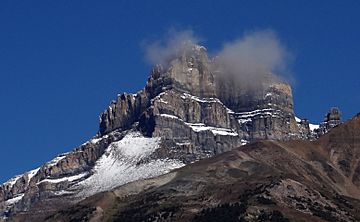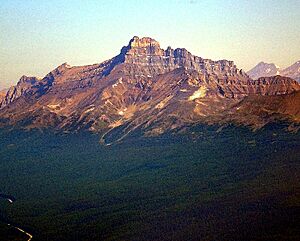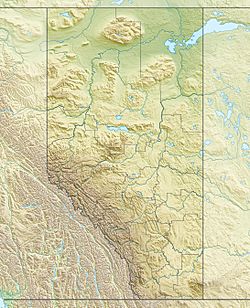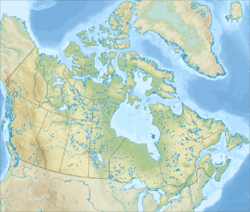Mount Hector (Alberta) facts for kids
Quick facts for kids Mount Hector |
|
|---|---|
 |
|
| Highest point | |
| Elevation | 3,394 m (11,135 ft) |
| Prominence | 1,759 m (5,771 ft) (Kicking Horse Pass) |
| Parent peak | Mount Victoria |
| Listing | |
| Geography | |
| Parent range | Murchison Group |
| Topo map | NTS 82N/09 |
| Geology | |
| Age of rock | Cambrian |
| Type of rock | Sedimentary rock |
| Climbing | |
| First ascent | 1895 |
| Easiest route | rock/snow/glacier climb |

Mount Hector is a huge mountain in Banff National Park, Alberta, Canada. It stands tall at 3,394 meters (11,135 feet) in the Canadian Rockies. The mountain is found in the Bow River valley, right next to the famous Icefields Parkway. It's about 17 km (11 mi) north of Lake Louise.
The mountain was named in 1884 by George Mercer Dawson. He named it after James Hector, who was a geologist. James Hector was part of an important journey called the Palliser expedition. The first people to climb Mount Hector were Philip Stanley Abbot, Charles Ernest Fay, and Charles S. Thompson in 1895.
What is Mount Hector Made Of?
Mount Hector, like other mountains in Banff Park, is made from a type of rock called sedimentary rock. This rock formed a very long time ago, between the Precambrian and Jurassic periods. It was created in shallow seas. Over millions of years, these rocks were pushed up and over younger rocks. This happened during a big event called the Laramide orogeny, which helped create the Rocky Mountains.
What is the Climate Like on Mount Hector?
Mount Hector has a subarctic climate. This means it has very cold and snowy winters. Summers are usually mild. Temperatures can drop below -20 °C (-4 °F). With the wind, it can feel even colder, sometimes below -30 °C (-22 °F). The snow and ice that melt from Mount Hector flow into small streams. These streams eventually join the Bow River.
 | Sharif Bey |
 | Hale Woodruff |
 | Richmond Barthé |
 | Purvis Young |



